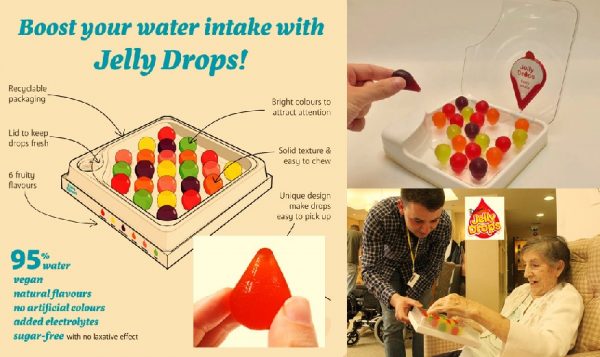
Grandson Innovates Jelly Drops To Help Grandma With Dementia Stay Hydrated
How for you will go to keep your grandma happy and healthy? A grandson’s love for his grandmother, who is suffering from dementia resulted in inventing Jelly Drop sweets to keep her hydrated and healthy.
Memory problems are one of several symptoms that people with dementia may experience. Others include difficulties with planning, thinking things through, struggling to keep up with a conversation, and sometimes changes in mood or behavior (Alzheimers.org.uk)
Alzheimer’s and dementia patients and the people who take care of them face many challenges. One of the big challenges is feeding and keeping them hydrated. We all need water to keep our body hydrated and drinking water should be part of our daily routine. Elders who suffer from dementia generally forget to drink water. This results in dehydration and electrolyte imbalance of the body.
London based Lewis Hornby invented Jelly Drops, sweet gummies to keep his aged grandmother hydrated.
Hornby’s grandmother Pat was hospitalized due to dehydration. Pat who had dementia loved to eat sweet. Hornby got inspired by Pat’s love for sweets and used his innovative skills to develop bright, raindrop shaped sweets called jelly drops. These jelly drops are made of 90% water and balanced electrolytes that are necessary for a person to keep body hydrated.
Hornby worked with group of people and took suggestions from Pat and other elders who suffer from dementia to develop jelly drops. These jelly drops appearance is like sweet candies and attracts dementia patients.
According to Hornby “For people with dementia, the symptoms of dehydration are often mistakenly attributed to their underlying condition, meaning it can easily go unnoticed until it becomes life-threatening. About a year ago my grandma was unexpectedly rushed to hospital; she was found to be severely dehydrated. Thankfully after 24 hours on IV fluids, she was back to her normal happy self, and is still enjoying a good quality of life to this day”
Like many grandchildren Hornby wanted best health for his grandmother. He tried different approaches to help him before finding a solution. Understanding dementia, consulting with doctors and spending time with people who has dementia in a care home made Hornby learn lot of stuffs. Finally, he introduced jelly drops to his grandma Pat and she immediately grabbed them.
“When first offered, grandma ate 7 jelly drops in ten minutes, the equivalent to a cup full of water, something that would usually take hours and require much more assistance”
Hornby won awards for his innovations – Dyson School of Design Engineering DESIRE Award and The Helen Hamlyn Design Award-Snowdon Award for disability and People Choice award at Pitch@Palace.
Alzheimer’s society of UK is supporting Jelly Drops and is working closely with Jelly Drops team to continue to develop the product and bring it to the market.
Dementia is memory loss. It is a common issue in older people. People with dementia often forget to drink water or liquid that could cause severe dehydration, confusion and hospitalization. If you are concerned about your parents, elders at home, prevent dehydration of loved ones by giving proper care.
- Place a jug filled with drinking water for easy reach.
- Keep a clear glass filled with water or a bright colored bottle or glass to draw their attention. Keep a table and place straw with bottle or glass.
- Spend time with elders and make drinking water, tea, coffee or ice popsicles an event for them.
- Leave notes and reminders to drink water on time. Put notices on mirror, near bed, on door, fridge. Set up multiple alarm to remind them that they should be drinking water on certain hours.
- Include ice cream, soup, fruits with more water content such as watermelon and jelly in their snack.
Jelly drop gummies could also be a solution for athletes and those personnel who work in hard conditions! This innovation could help millions of people who are suffering from various conditions that require help to prevent dehydration such as epilepsy, kids with special needs, cancer patients and for dementia.
References:
Author: Sumana Rao | Posted on: June 16, 2020
« Plant Based Biodegradable PEF Plastic Bottles COVID-19: Using economic stimulus to reduce the long-term hunger impact »






















Write a comment